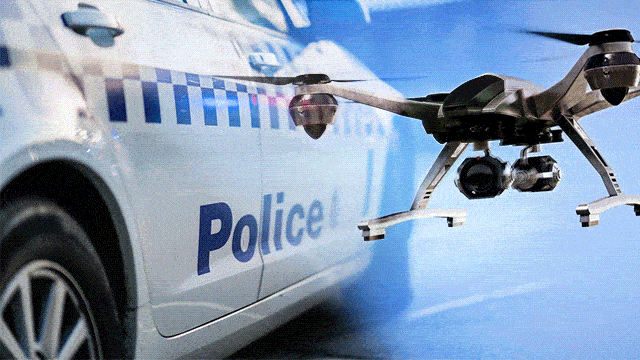Drones, door-knocking and dobbers: How police powers have grown during the COVID pandemic


Legal experts have raised concerns about police powers during the coronavirus pandemic. Photo: TND
Drones, number-plate scanners, roadblocks and air patrols.
Since the coronavirus pandemic hit Australia in March, police powers have dramatically expanded in the name of preserving public health.
And while legal experts acknowledge extraordinary measures are required to contain the virus, there are growing fears authorities have gone a step too far.
The alarm was raised on Thursday after it emerged Victoria Police was planning to fly drones and helicopters over public places during the AFL Grand Final weekend.

Police issued fines at St Kilda beach as groups of people flocked to the warm outdoors. Photo: ABC
The controversial decision was prompted by concerns that Richmond or Geelong footy fans will ignore crowd size restrictions and gather in the streets after the final siren on Saturday evening.
Speaking to 3AW on Thursday, Victoria Police Assistant Commissioner Luke Cornelius said the “drones won’t be hovering over people’s pizza ovens in their back yards”.
“We’ll be making sure … that if people go mobile, out and about, they’re doing so in keeping with the CHO directions,” he said.
Mr Cornelius added that any illegal gatherings in homes would also attract police attention.
“If we do receive calls from members of the community about large gatherings in people’s homes, we will certainly looking to respond those calls as well,” he said.
In a statement to The New Daily, Victoria Police confirmed that drones would be deployed, as well as highway patrol officers, public response team members, PSOs and police on horseback and in helicopters.
“We are aware of commentary regarding concern about police using drones to monitor people in their backyards this weekend,” a spokesperson said.
While the heavy police presence might sound alarming to Australians, for millions of people in locked-down Melbourne, it’s just another ordinary day.

Drone flying over Melbourne’s inner-north suburbs. Photo: AAP
For months, popular meeting spots like parks or beaches have become the target of mass surveillance and police patrols.
Anti-lockdown protest organisers have been arrested in their own homes, while drivers travelling outside their 25km radius risk being pulled over by police using number-plate recognition software.
Dozens have copped $200 fines for not wearing face masks, and many others have been dealt $1652 fines for breaching stay-at-home orders.
Those who host illegal indoor gatherings face fines of nearly $5000.
And it’s not only police leading the charge.
Data from Victoria Police shows tens of thousands of neighbours have been dobbing in rule-breakers in record numbers.
In the month of August alone, COVID-related calls to the police assistance line exceeded 26,400.
Legal experts speak up
Anthony Kelly, executive officer atinner-city Melbourne’s Flemington and Kensington Community Legal Centre, said he was concerned by the “normalisation of these intrusive and expanded police practices and powers”.
“The government launched this Drones Unit in July last year, and the Victoria Police and minister were very careful in stating this was not about mass surveillance, and yet it is mass surveillance,” he told The New Daily.
“The worrying point is, it’s not just about the surveillance itself.
“There is very little to almost no regulation of the footage from these drone units and how the data is being collected and stored over time.”
Mr Kelly added these sorts of policing technologies “usually concentrate on already targeted communities”, such as Indigenous Australians and migrants.
“Racial profiling, discriminatory policing, the feeling of being constantly targeted even if you’re not doing anything wrong … it does have discernible mental health impacts, particularly on young people’s behaviours,” he said.
Nikita White, a campaigner at Amnesty International, said she believed the heavy-handedness of police during the pandemic was often “disproportionate” to the risk.
Tweet from @honi_soit
“What we’ve seen over the last few months is a disproportionate police presence at small protests,” she said, pointing to a recent incident at the University of Sydney when a law professor was pushed to the ground by police while observing a protest.
“We’ve had reports of arms broken, and people suffering injuries and bruising while being arrested for attending a peaceful protest.”
However, Ms White conceded that Victoria was “very different to the rest of the country” given the state’s aggressive second wave of coronavirus cases.
“At the time, when we did have really high numbers in Victoria, the tougher restrictions were appropriate,” she said.
“But we did see some really worrying incidents of policing.”








